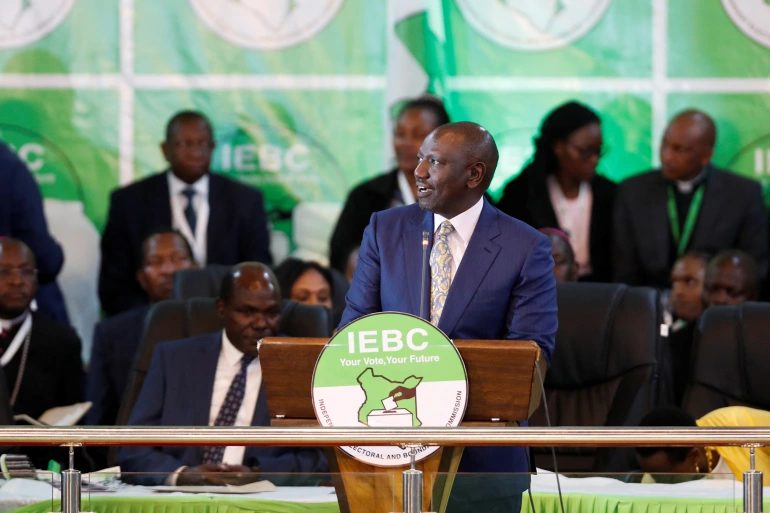China Again and the Kenyan Elections
Uhuru Kenyatta, the current president of Kenya, one of the most important countries on the African continent, has completed his two terms and is now at the end of his tenure. The tumultuous presidential elections in this country have just been held, and the enthusiastic campaigns, rallies, and street and stadium celebrations of the candidates have changed the atmosphere of the cities and villages of this country, as in previous terms. Unlike the previous term, there was not much news of riots and clashes among the supporters of the candidates, but disputes over the election results and discussions of fraud and disagreements over vote counting eventually emerged. The very narrow margin between the two rivals sparked such controversy. Kenya’s political and economic experience in recent years can offer many lessons for developing countries.
Two Enthusiastic Candidates
William Ruto, the current deputy president, was the rival of Raila Odinga, the opposition leader, in the elections, and was ultimately declared the winner by the election commission with 50.49% of the votes. Odinga did not quite stand as the opposition leader.
Ruto, as the current deputy president, had serious disagreements with him, and the current president supported the opposition leader, who was his long-time rival and adversary, in the elections. The enthusiastic and bustling campaigns and election festivities were accompanied by both candidates’ commitment to maintaining peace and refraining from creating tensions after the final results were announced. The 2007 elections claimed 1,200 lives, and the 2017 elections left 100 dead.
Election Unrest
Now, due to the severe conflicts and instability caused by discussions of fraud in the previous term, candidates’ representatives are closely monitoring the vote counting, which has slowed down the process. Disagreements over the vote counting process and the announced results have overshadowed everything, and unrest has begun. Leaders of some countries quickly congratulated William Ruto, and he has also announced his victory.
Rich, Poor, Indebted
Like many countries in Africa, Kenya has special natural resources and mines, and many investors have their eyes on exploiting these resources. One of the latest chapters in the long story of interactions between foreign public and private investors in this country is the serious investment of Indians in Kenya’s oil industry. However, Kenya has long faced a debt crisis, with its income and expenses not matching, and the COVID-19 pandemic severely impacted the fragile economy of this country. Among all economic and livelihood issues, China, as expected, tops the list of topics.
The Chinese Campaign
The deputy president, who now stands against him and his policies, attacked China in his campaign and criticized the damage this country has done to Kenya’s economy and society. He promised to send back the Chinese who have started ordinary businesses in Kenya and are competing with Kenyans in regular jobs like selling mobile phones. Most importantly, he promised to make China’s investment contracts in Kenya public.
China’s large investment projects in developing countries have a specific feature: the complete confidentiality of the contracts. Therefore, William Ruto’s promise to make these contracts public was a very bold move. Raila Odinga, the opposition leader who is now allied with the current president, shares in the cooperation with the Chinese. Odinga’s simple solution to justify the presence of the Chinese was to blame the West and point to the historically destructive role of European countries and the United States.
China in Kenya
China’s investment contracts in Africa have created some major projects in this country, and highways and a special railway line were the result of Chinese money. The nature of the contracts became highly controversial and sparked significant sensitivity in this country. However, this special railway line, which had a very noisy opening ceremony, brought a positive transformation in Kenya. Despite the public anger over the country’s indebtedness and the secrecy of the contract and serious signs of corruption in the process of this contract, the people of Kenya are very happy with the creation of this railway line.
China, Kenya’s Creditor
China, as one of Kenya’s serious creditors, stands firm on its claims. The officials of this country, by downplaying Kenya’s debts to China, have refused to review and forgive at least part of the debt. Both electoral rivals promised to rescue from the debt crisis, yet the prospect of fulfilling this promise is not clear. With the victory of the China-critical candidate, it remains to be seen whether Ruto will stay true to his promises regarding the Chinese, especially making the Chinese contracts public, or if the Chinese government can control him. For countries that have special contracts with China, Kenya’s experience is a great lesson.

